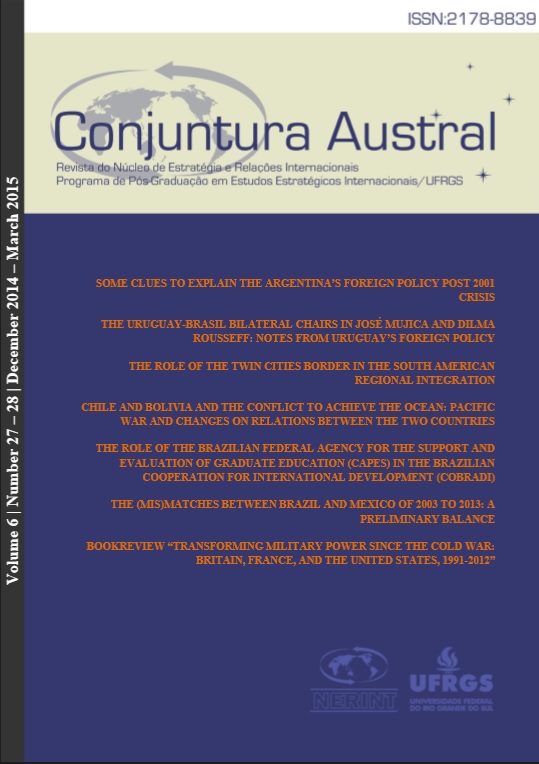The Uruguay-Brasil bilateral chairs in José Mujica and Dilma Rousseff: notes from Uruguay’s foreign policy
DOI:
https://doi.org/10.22456/2178-8839.54403Keywords:
Uruguay, Brazil, Foreign policy, BilateralismAbstract
On 1 March 2005, a coalition of progressive political parties Frente Amplio assumed executive power after winning the 2004 presidential election, electoral and political event unprecedented in Uruguay. The formation of the first leftist government in this country marked changes in its foreign policy and a new model of international integration. Next, we turn first to the Uruguayan foreign policy during the progressive governments from a general characterization of this and the international dimension in the program frenteamplista government. We will continue with a brief overview of the foreign policy of José Mujica and his relationship with Brazil Dilma Rousseff, finally, in the third paragraph, the global, regional and bilateral dimension of current cooperation agendasDownloads
Downloads
Published
How to Cite
Issue
Section
License
Authors who publish with this journal agree to the following terms:
a. Authors retain the copyright and grant the journal the right to first publication, with the work simultaneously licensed under the Creative Commons Attribution-Non Commercial-ShareAlike 4.0 International License, which allows its use, distribution and reproduction in any medium, as well as its transformation and creations from it, as long as the original author and source are credited. Also, the material cannot be used for commercial purposes, and if it is transformed, or used as a basis for other creations, these must be distributed under the same license as the original.
b. Authors are able to enter into separate, additional contractual arrangements for the non-exclusive distribution of the journal's published version of the work (e.g., post it to an institutional repository or publish it in a book), with an acknowledgment of its initial publication in this journal.
c. Authors are allowed to deposit, in the repositories accepted by Conjuntura Austral, the preprint version of the manuscripts submitted to the journal prior to and during the submission process, as it can lead to productive exchanges, as well as earlier and greater citation of published work (See The Effect of Open Access)
d. Authors are permitted and encouraged to publish and distribute online (in institutional and /or thematic repositories, on their personal pages, etc.) the postprint version of the manuscripts (accepted and published), without an embargo period.
e. Conjuntura Austral: Journal of the Global South, imbued with the spirit of ensuring the protection of regional academic and scientific production in Open Access, is a signatory to the Mexico Declaration on the use of the Creative Commons BY-NC-SA license to guarantee the protection of academic and scientific production in open access.








